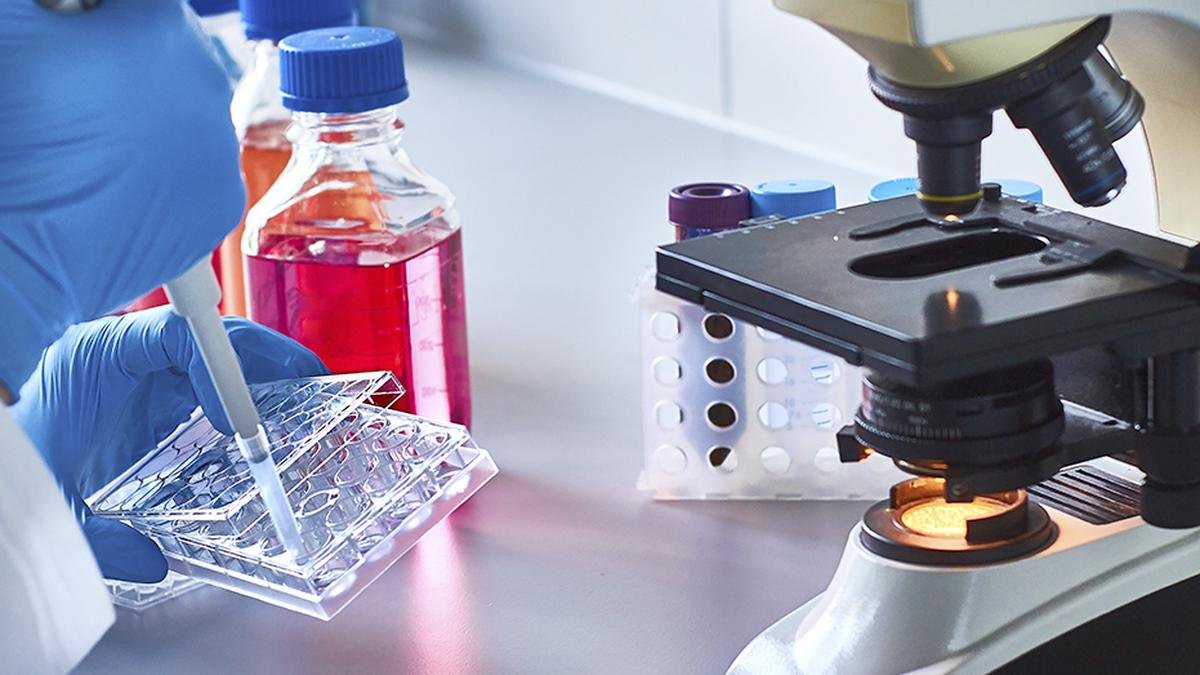IIT Madras launches public access cancer genome database to help cancer research, drug discovery, in India

Scientist pipetting research samples by the microscope
| Photo Credit: Catalin Rusnac
A cancer genome database that aims to decode the genomic landscape of cancers prevalent in India was recently launched in Chennai. A first-of-its-kind database, this was developed by the Indian Institute of Technology Madras (IIT-M) and aims to transform cancer research in the country.
In a recent report of the National Cancer Registry Programme, the Indian Council of Medical Research (ICMR) indicated that one in every nine people in India is likely to develop cancer in their lifetime. Currently, 14,16,427 persons are living with cancer. According to the registry there has been a 12.8% increase in cancer incidence every year since 2022.

Under-represented in global genome studies
Despite a high cancer incidence, the country is underrepresented in global genome studies, say researchers. Efforts were not made to capture and catalogue the specific genetic variants of Indian cancers for want of genomic architecture of cancers prevalent in the country. As a result, there have been little efforts to develop diagnostic kits and or drugs.
IIT Madras’ National Cancer Tissue Biobank launched the cancer genome programme in 2020 to fill the gap in genomic landscape for various cancers. The tissue biobank, a joint initiative of the Department of Science and Technology of the Union government, is a non-profit community-based facility in the institute’s biotechnology department.
The biobank collects cancer tissue samples with consent from cancer patients along with information about previous medical history. The samples and information are provided to researchers to facilitate cancer research and thus improve cancer diagnosis and treatment.
A total of 960 whole exome sequencing from 480 breast cancer patient tissue samples were collected from across the country and completed for the genome atlas.
The Institute, in collaboration with Karkinos Healthcare, Mumbai, the Chennai Breast Clinic and Cancer Research and Relief Trust, Chennai, analysed the data and assembled the anonymised summary of genetic variants from Indian breast cancer samples.
IIT Madras director V. Kamakoti announced the completion of the Indian breast cancer genome sequence generation and released the Bharat Cancer Genome Atlas (BGCA) on February 3. Clinicians across the country and abroad can access the database at bcga.iitm.ac.in.

Access to all
Mr. Kamakoti said the aim of making the database public was true to the institute’s ‘IIT M for all’ commitment to society. Earlier the institute had released the brain data.
Researchers can delve into the data and gain insights into the causes behind cancers and help devise prevention and early intervention initiatives. The atlas also provides details of contemporary Indian breast cancer populations to classify variants involved in early diagnostics, disease progression and treatment outcomes, Mr. Kamakoti explained.
The institute’s Centre of Excellence on Cancer Genomics and Molecular Therapeutics, funded under the Union government’s Institution of Eminence initiative, led the research.

Head of the centre and project coordinator S. Mahalingam said the database would be an invaluable resource to identify cancer-specific biomarkers in India this enabling early detection of breast cancers. “It will be very useful to identify novel drug targets for developing better treatment strategies specific to the Indian population,” he explained.
Prof. Mahalingam, who is also a faculty in the institute’s Department of Biotechnology, added: “BCGA aims to host data from researchers working on cancer genomics across cancer types and would be open to accepting submissions.” The data will be used to identify biomarkers to identify high-risk groups, monitor cancer progression, design strategies for personalised treatment and understand treatment outcomes, he said.
Boost to ‘personalised medicine’
The genome atlas provides knowledge on the genetic basis of cancer progression and evolution and is expected to help biomedical research and healthcare system in the country shift to ‘personalised medicine’ whereby an individual’s genetic and molecular information in the clinical decision-making process.
The National Center for Precision Medicine in Cancer, an initiative between IIT Madras and Karkinos Healthcare, performed the analysis, with the aim to accelerate interdisciplinary research and development of affordable cancer care solutions.
Published – February 07, 2025 03:05 pm IST



Post Comment